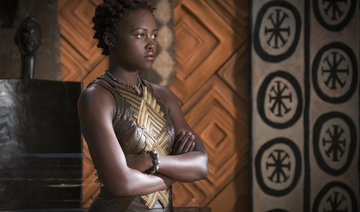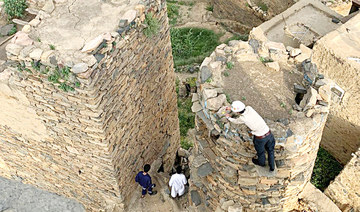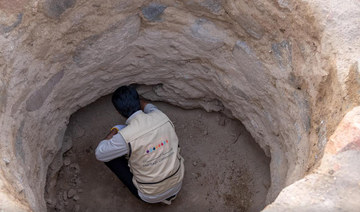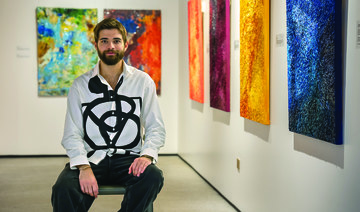JOHANNESBURG: “Black Panther” has burst onto the screen in Africa, handing a powerful response to the unfortunate remarks about the continent by President Donald Trump.
As the red carpet in South Africa swirled with stunning outfits and exclamations in the local isiXhosa language used in the film’s Wakanda kingdom, cast member John Kani laughed at the US president’s views, which several African nations have openly scorned. (Oscar-winning actress Lupita Nyong’o said simply: “No comment.”)
The South African actor Kani, like many at Friday night’s Johannesburg premiere, expressed pride at seeing an Afrofuturistic society that celebrates traditional cultures and dreams of what the world’s second most populous continent can be.
“This time the sun now is shining on Africa,” he said. “This movie came at the right time. We’re struggling to find leaders that are exemplary and role models ... so when you see the Black Panther as a young boy and he takes off that mask you think, ‘Oh my God, he looks like me. He is African and I am African. Now we can look up to some person who is African.’“
Added actress Danai Gurira, who grew up mostly in Zimbabwe: “To bring this film home is everything.”
The film has opened in other top economic powers across Africa, where a growing middle class flocked to IMAX showings and shared vibrant opening-night images on social media.
“The African culture highlighted in the movie is so rich that it makes me feel proud of being black. I totally love it,” said Liz Muthoni after a screening in Kenya’s capital, Nairobi. “I can watch it again and again.”
“Black Panther” screened a few days ago in Kenya’s western city of Kisumu, where Nyong’o’s father, Anyang, is the local governor.
“Sometimes we think that we have two choices to make in Africa,” he wrote this month in The Star newspaper. “Choice one: We maintain our traditions and cultures and stay backward forever. Choice two: We modernize by becoming westernized and forgetting our cultural traditions which, by their very nature so we think, are stuck in the past. The experience of the Wakanda people teaches us otherwise.”
In Ethiopia’s capital, Addis Ababa, “Black Panther” has been selling out its five-times-a-day screenings at the only theater showing the film.
“Moviegoers are enjoying the African heritage part of the film. This is also unique for us because Ethiopia is often mentioned alongside the black power and black movements as the only nation not colonized by Western powers,” said Elias Abraha, the cinema’s operations chief. “There are people who changed their flight plans just to watch the movie.”
Some Ethiopian fans quickly changed their Facebook profile pictures and expressed their adoration.
“Tears stream down my face as I write this,” said one Facebook user who goes by LadyRock Maranatha. “Black Panther was basically an enormous . roller coaster of emotions, adventure and most of all the affirmation of what I had felt since I left my country for Cambridge and came back. I cried for my people and felt immense pride in being Ethiopian and most importantly AFRICAN. We are truly resilient and beautiful.”
As the audience poured out of the Johannesburg screening, spirits were high.
“Totally blown away. I got emotional,” said reality TV star Blue Mbombo, who admitted that going into the film she thought the expectations had been “hype.” But she praised its use of cultural touches like Basotho blankets and called the use of the isiXhosa language “very humbling.”
Others considered the American side of the story. “An African-American coming back to Africa, it’s a nice reminder of their heritage as well,” said Ayanda Sidzatane. She called the film awesome. “We knew it would be cool but not like this.”
As Ghanaian celebrity blogger Ameyaw Debrah put it on social media: “What will #BlackPanther make the world think of Africa now?“
Tears, exuberance as ‘Black Panther’ opens across Africa
Tears, exuberance as ‘Black Panther’ opens across Africa

Saudi animation on pandemic-era worship in Makkah draws praise in Cannes
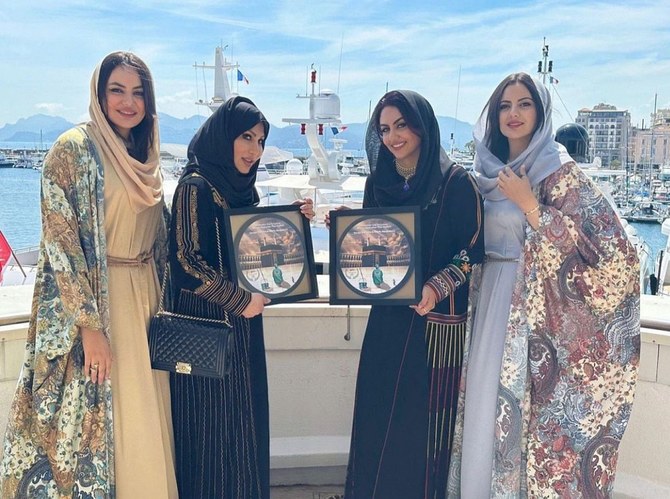
JEDDAH: Saudi film “Wa Isjod Wa Iqtareb” (“Prostrate and Draw Near”) won the “Animation That Matters” award during the Animaze Animation Day event at Marché du Film, the industry networking section of the Cannes Film Festival.
Directed, produced, and written mother-daughter duo Suraya Al-Shehry and Nabila Abuljadayel, the film was created via production company Suraya Productions and explores the period of time during the COVID-19 pandemic when cleaning staff replaced the usual mix of international worshippers at the Grand Mosque in Makkah.
The film integrates traditional art and 2-D animation, but it is its subject matter that makes it unique, according to Al-Shehry.
“In the history of cinema, there has been a noticeable lack of films focusing on Makkah and the Holy Mosque, particularly in the realm of animation. Collaborating with my daughter … on our short animated film has brought me immense joy and a profound sense of fulfilment,” she said.
She added that the film portrays a significant moment in global and Islamic history by showcasing the Grand Mosque devoid of pilgrims, with the exception of the cleaning and maintenance staff who had the unique opportunity to pray there during the pandemic when no one else could.
Abuljadayel reflected on the nearly two-year project, saying: “For me, the best reward was the chance to collaborate with my mother, an experience that transcends any accolade.”
She emphasized that receiving the award aligned with the film’s core message of celebrating shared humanity.
“I firmly believe that what comes from the heart resonates with others, whether expressed through animation or my artwork, and the greatest testimony of that is the success of this film,” she said.
The creative duo seem to be keen to continue their success, with another project scheduled for completion next year.
Ancient castles in Sabya governorate reflect architectural heritage
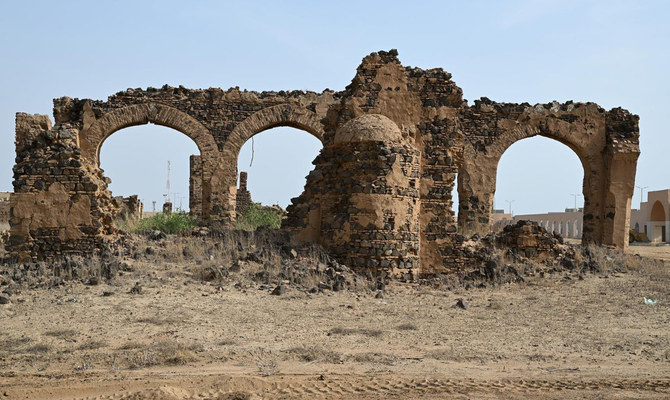
- The Sabya Archaeological Castle has origins that date to the early 20th century
RIYADH: The Sabya governorate in the Jazan region is a treasure trove of archaeological wonders, each with its own unique story.
Among these is the Sabya Archaeological Castle, whose origins date to the early 20th century. The castle, steeped in history, is a must-visit for any archeology enthusiast or researcher.
The castle is situated near Sabya Avenue, within King Fahd Park. It is part of the present city of Sabya, which offers a view of Wadi Sabya.
The Sabya Archaeological Castle, an architectural marvel, boasts spacious rooms with high ceilings and thick walls. The walls, adorned with beautiful geometric and floral patterns, are a testament to the skill of the craftsmen who built them.
Local materials such as volcanic stone, wood, and limestone were used during construction. Some accounts suggest that the clay used in making bricks was sourced from the banks of Wadi Sabya.
The use of volcanic stones of various sizes and shapes in particular gives the castle a unique and captivating beauty. The stones were obtained from volcanoes near the city, including Jabal Akwa, located a short distance northeast of Sabya.
The mosque, situated north of the castle, was also constructed using the same building materials as the castle and other structures in the area. It was intended for prayers and gatherings of religious leaders, dignitaries, and the people of Sabya. Its mihrab, or prayer niche, still stands despite some damage.
Some accounts suggest the presence of remains of other buildings in the vicinity of the castle, opening the possibility of conducting archaeological excavations to reveal more secrets about this site.
The Kingdom’s Heritage Commission is diligently working to preserve the Sabya Archaeological Castle, recognizing its significance as one of the most important archaeological sites in the Jazan region.
Artist captures Saudi charm with digital works
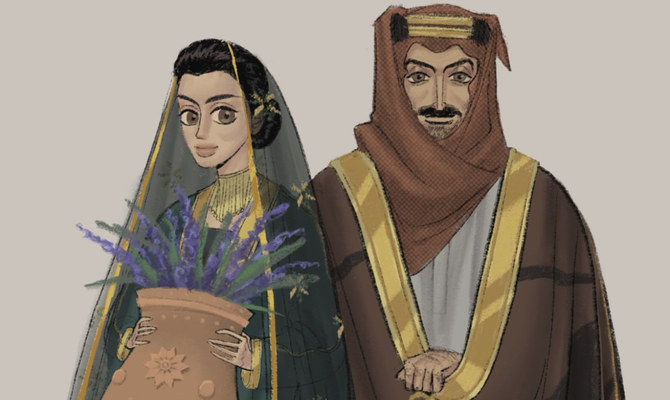
- Ghada Al-Shammari says art can be a means to showcase nation’s rich heritage
RIYADH: Timeless Arabic songs and heartfelt poetry provide the inspiration for Ghada Al-Shammari’s digital art, which showcases the Kingdom’s culture and society.
Al-Shammari's first artwork in 2017 was inspired by a popular Saudi song by Majed Al-Esa called “Hwages,” which means “concerns” in English.
The music video provided a comment on society by using satire, showcasing women driving cars, skateboarding, and playing basketball — activities that at the time were not easily accessible for women.
“I liked how they portrayed women in the traditional Saudi abaya, which motivated me to draw it,” Al-Shammari told Arab News.
For one of her artworks Al-Shammari was inspired by a poem by literary icon Prince Badr bin Abdul Mohsen and popularly performed by the late Saudi singer Talal Maddah.
The drawing depicts a man glancing at a woman who has her eyes downcast, with an oud instrument between them, and the 1980 song title “Forgive Me” written in Arabic text above the illustration.
The Saudi artist said that she tries to capture the poet’s feelings with her artwork, adding: “Romantic songs with descriptions of the poet’s beloved have been particularly inspiring for me.”
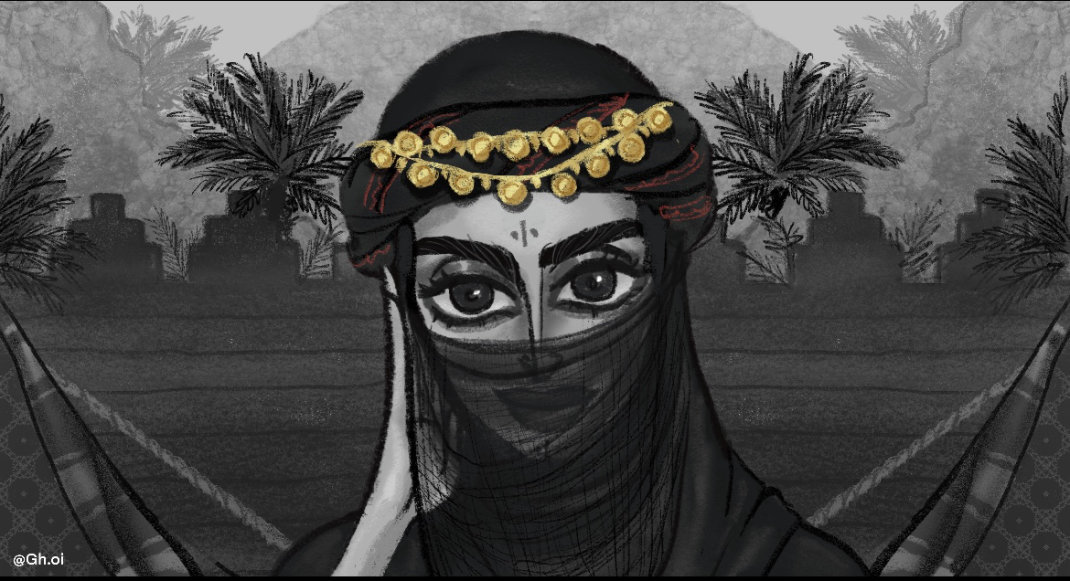
Al-Shammari draws inspiration from the beauty within the Kingdom’s culture. Many of her artworks depict women wearing traditional Najdi-style dresses and gowns with draping silhouettes and glimmering gold headpieces and turbans.
The men are depicted with striking features and wearing traditional garments like the head coverings called ghutra or shemagh, and bisht, the men’s cloak commonly worn in Saudi Arabia and other Gulf countries.
“Saudi culture and traditions have significantly impacted my work. Growing up, I used to think of Saudi Arabia as just what was around me in terms of environment, customs, and traditions,” Al-Shammari said.
When she moved from her hometown of Hafar Al-Batin to the capital Riyadh, Al-Shammari said her friendships and acquaintances showed her a new world of ideas that elevated her artistic vision.
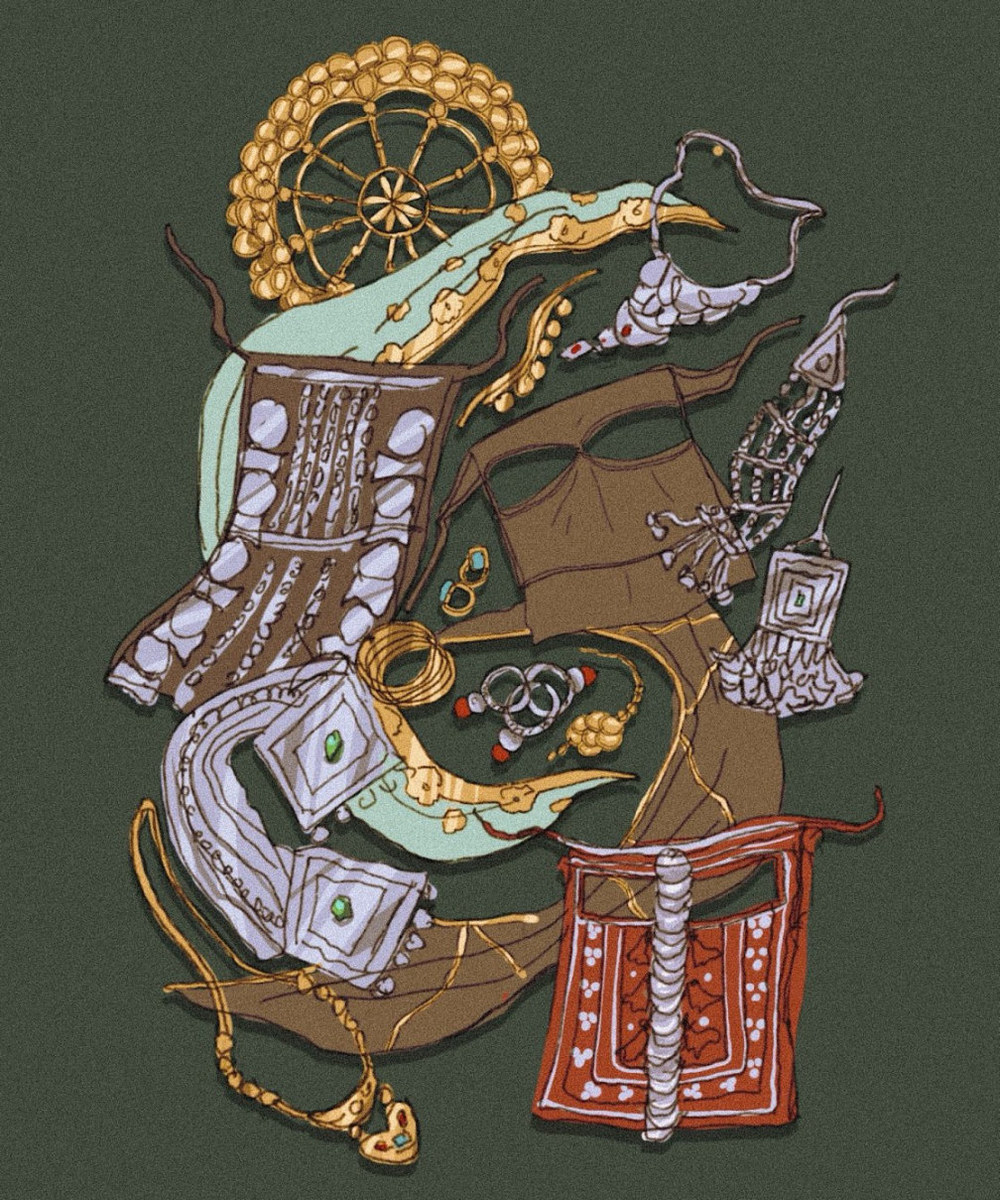
She added: “They shared stories about their region, important landmarks, and fascinating tales that were unique to their areas. This motivated me to learn more about my country and enjoy drawing the diversity and differences I discovered in my artworks.
“Saudi Arabia is full of exciting things, and its diversity is what fascinates me the most. Each region has its own heritage, traditions, architecture, and unique dialect, which makes me eager to learn more and create works that reflect this beautiful diversity.”
Al-Shammari said she selects particular color combinations to evoke the emotions she aims to convey, opting for brighter colors for her cheerful and vibrant works.
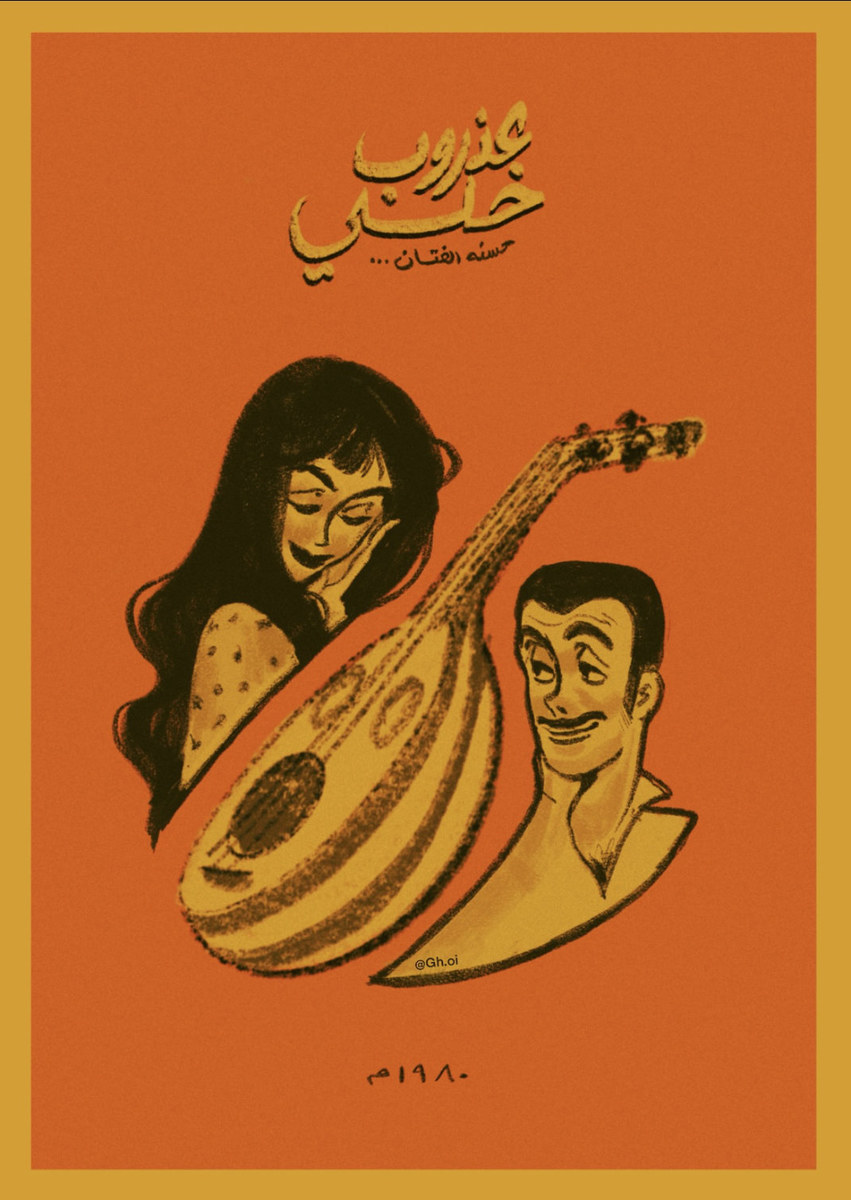
Al-Shammari graduated from the College of Arts and Design at Princess Nourah bint Abdulrahman University with a bachelor’s degree in fine arts.
She added: “Through this specialization, I discovered many artistic and historical aspects, learned about various artists, and got to understand their ideas and philosophies, which transformed my perspective of my work.”
Her love of art began as a child when she would draw characters from her favorite anime and cartoons.
“I started focusing on drawing from an educational perspective at the age of 12 through YouTube tutorials on drawing anime and cartoons, which sparked my artistic journey,” Al-Shammari said.
She added that art is important as it showcases the cultural aspect of a country and its heritage, conveying its history and traditions that help define life in the past and present.
She said: “It serves as a way to preserve and transmit this heritage from one generation to the next, seeking to document knowledge and memories.
“Additionally, from an economic standpoint, art is considered a means to attract tourists interested in discovering the country and its civilization.”
For more information on the artist, visit her Instagram @gh.oi.
Saudi’s ‘Norah’ receives the Special Mention accolade at Cannes
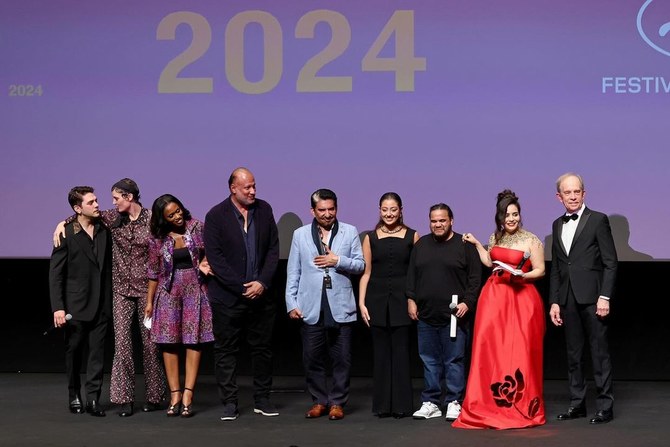
DUBAI: Saudi film “Norah,” starring actress Maria Bahrawi, this week received the Special Mention accolade, which recognizes films for outstanding achievements, at the 77th Cannes Film Festival’s Un Certain Regard awards.
The cast and crew, accompanied by director Tawfik Al-Zaidi, stepped onto the stage to accept the accolade in front of a full house.
The film, shot entirely in AlUla, is set in 1990s Saudi Arabia when conservatism ruled and the professional pursuit of all art, including painting, was frowned upon. Besides Bahrawi, the movie also stars Yaqoub Al-Farhan and Abdullah Al-Satian. It follows the story of Norah and failed artist Nader as they encourage each other to realize their artistic potential in rural Saudi Arabia.
“Norah” had its official screening at the festival on Thursday, becoming the first film from the Kingdom to screen as part of the official calendar at the event.
The movie was backed by the Red Sea Fund — one of the Red Sea Film Foundation’s programs — and was filmed entirely in AlUla in northwest Saudi Arabia with an all-Saudi cast and a 40 percent Saudi crew.
Un Certain Regard’s mission is to highlight new trends in cinema and encourage innovative cinematic works.
Chaired by Canadian actor, director, screenwriter and producer Xavier Dolan, the jury included French Senegalese screenwriter and director Maimouna Doucoure, Moroccan director, screenwriter and producer Asmae El Moudir, German-Luxembourg actress Vicky Krieps, and American film critic, director and writer Todd McCarthy.
Chinese director Guan Hu’s “Black Dog” won the top prize in the Un Certain Regard section.
Marking Guan’s debut at Cannes, the film follows a former convict who forms an unexpected bond with the titular animal while clearing stray dogs in his remote hometown on the edge of the Gobi Desert.
The jury prize was awarded to “The Story of Souleymane,” directed by Boris Lojkine, marking his return to the festival after a decade since his 2014 feature “Hope.”
The film portrays the journey of a Guinean food delivery man who must create a compelling narrative for his asylum application interview in Lyon within a two-day timeframe.
Dave Chappell says support for Gaza war is result of ‘antisemitism in the West’ at Abu Dhabi show
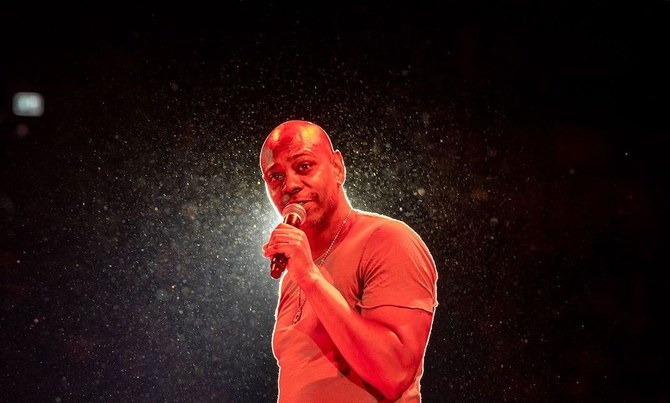
DUBAI: US comedian Dave Chappelle performed to a packed audience at Abu Dhabi’s Etihad Arena on Thursday as part of Abu Dhabi Comedy Week, where he also addressed the war in Gaza.
“What is happening in Gaza is a direct result of antisemitism in the West,” he said on stage.
“If you are in America, the best thing you can do is to make American Jews feel safe, feel loved and supported so they can know they don’t have to support a country that is committing genocide just to feel safe,” he added.
Chappelle previously slammed the Israeli bombing of Gaza, as well as the US support for it, at a show in Boston in October.
According to people in attendance, an audience member asked Chappelle to shut up, which sparked a heated response from the comedian.
“You can’t take tens of billions from my country and go kill innocent women and children and tell me to shut the f--- up,” he said, according to the Wall Street Journal.
Some members of the crowd began chanting “free Palestine,” to which Chappelle replied: “You are damn right, free Palestine.”




